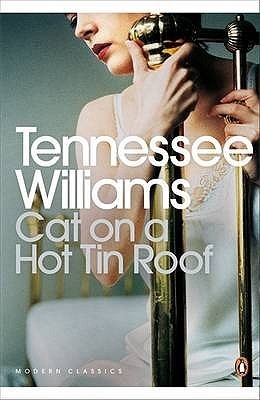Cat on a Hot Tin Roof by Tennessee Williams
My rating: 3 of 5 stars
We all remember the pain of reading Shakespearean plays in school. Sadistic English teachers with shattered dreams of being something better forcing us to learn whole passages by rote …the quality of mercy is not strained…, without once reflecting on the irony of their own lack of mercy.
If you had intellectually snobby parents like mine, the closest to sympathy their innate veneration of the Bard would allow, would be the grudging admission that, “well, really Shakespeare is not meant to be read. It’s meant to be performed.”
Actually, during the later years in which my own intellectual snobbery got me reading his plays autonomously, I never found this to be true. Unless you’d already studied Henry CXXII part VI, live performances went too fast; you missed too much of the subtle word play or the historical context. Idem for Ibsen. As for my favourite playwright Miller, I always found the dialogue to be so supremely evocative of the scene that if anything a live performance introduced risks of spoiling the perfect acting I imagined in my own head.
However, for Tennessee Williams, I don’t think this is the case – at least not as far as ‘Cat on a Hot Tin Roof‘ is concerned. I read the play, never having seen it staged nor having watched the film. My first impression was the dialogue came across as hammy, overdone and at times (needlessly and repetitively) redundant, (such that the point could have been made with fewer lines and more subtext). To wit, the titular feline metaphor is hammered into the reader’s ears in Act I. Not once, but twice.
Moreover, if you are looking for an entertaining plot or clever character arcs, you have come to the wrong place. Williams is writing as an American realist – he sees little scope for moral progression, at least not in a story that takes place over one steamy night in the big house of a Southern plantation. This left me wondering what the big deal with Cat might be, whether it wasn’t just a mediocre script that benefited unduly from good timing and a nascent American Empire, hungry to grow cultural roots in the fertile soil of its burgeoning economy.
On reflection, though, it occurs to me that these shortcomings would be somewhat attenuated in a live performance. There, we can imagine how strong performances might make the Southern nouveaux riches sparkle: the droll alcoholism in the fallen favourite son Brick, the desperate aching of womanhood in his wife Margaret. The bellicose, base honesty in his father, Big Daddy.
Indeed, Cat might be as much about the atmosphere as the story. It evokes a particular mood and feeling; which perforce comes alive not in the words themselves, but in how they are spoken and in the silences that can unshroud a deeper meaning. This is not a finished piece of literature. Rather, it is a set of instructions to the actors and director, and should perhaps be read by them and them alone.
View all my reviews


